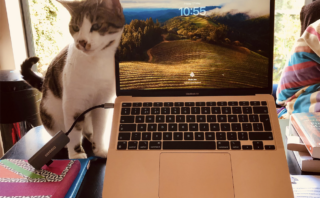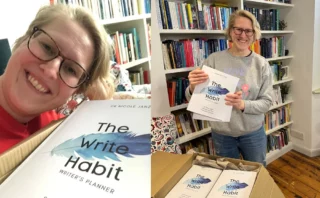Three questions that help you make a compassionate, intentional decision — and avoid feeling like a failure
Every November, writers world wide come together to write a novel (NaNoWriMo) or academic books and papers (AcWriMo). I’ve been joining many of these, lead accountability groups, and tried to write my own books and papers during these challenges.
After years of seeing myself and other writers join in, I’ve discovered that these challenges can boost your writing — or push you into deep block just before Christmas.
Perhaps you are already wary that you’ve started writing sprints in the past, only to give up after two weeks, feeling like a failure?
Just take a breath.
You have the power to make that decision right now, before you’re swept up by the social media craze.
Here are a few questions and prompts to help you make your decision, and they come directly from my interactions with writers (and my own, personal failure stories).
How to decide if NaNoWriMo or AcWriMo is right for you
The first time I tried Academic Writing Month (AcWriMo) — just like novel writing month but for academics — I was excited. Finally, writing would take the front seat, and I would finish an important research paper before Christmas. I couldn’t wait for day 1, and I had all my word counts and deadlines planned out. Psychologically, I know now as a coach, planning can be a big anxiety relief because you see everything laid out, and it feels more doable when you have small action steps. But keeping up momentum was another story. In fact, for academics and postgraduate students who teach, November can be incredibly busy. I was swamped with teaching my courses (and preparing them), committee work, students who needed my help in the dark English winter months, and marking essays and exams.
Each day, I started pushing writing to the next day. Sometimes I’d squeeze it in at night. I thought, if I just work harder, I can do it.
I couldn’t.
It led to my first mini burnout that became a big one a few years later.
And I felt like a failure — because it seemed on social media that everyone seemed to manage their word counts and celebrated, while I sucked.
In a nutshell, what went wrong was:
- I got swept away by the social media hype and forgot to pause or make a conscious decision of the challenge works for me at this time
- I planned out word counts and completely ignored that I could not in fact block out time — so I set myself up for failure
- I had no support network close to me, just social media posts of successful people which pushed me deeper into negative thinking
- I had no habits in place for those days that I could write, so that I get into flow fast without worrying about how far behind I already was
Does that resonate?
I don’t want this to happen to you, and I’ve learned many ways to plan writing more intentionally, rather than jumping on that November train that does not always fit with my life.
How to decide if NaNoWriMo or AcWriMo are for you
Any challenge can massively boost your writing. But it can also destroy your confidence and (mental) health.
Here are three questions to ask yourself right now. Take pen and paper and answer them to make your decision.
1. Can you realistically focus on ONE THING in November?
If your life is swamped with non-negotiable obligations (day job, other deadlines, childcare…) in this month, it might not be the right time.
I’m not talking about excuses, but about real life obligations and priorities that will get in your way of writing those thousands of words during November. If this month is not your best writing time, it’s OK to say “no” to NaNoWriMo or AcWriMo without feeling bad. Other people might have less on their plate (or give up after a few weeks, who knows).
2. Can you name 2–3 people close to you who would support you with compassion?
Social media can be motivating, but they can also give you FOMO and the feeling you’re not good enough when you compare yourself with other writers. Social media is not your support group.
Instead, do you know two to three people who you can create accountability with? Are these people who can pull you through the month of writing gently and with compassion, so that “slow days” don’t make you feel like you want to give up?
If yes, it’s much more likely that you’ll stay on track and keep a healthy mindset.
3. Do you have a writing habit established?
A challenge is a curious thing. The rush of adrenaline and dopamine hits from sharing your wins on the first few days can give you fast momentum and writing flow.
But be careful. This rush will fade away after a few days — especially if you don’t have a writing practice as a backup. I call that the ‘deadline trap’. If you’ve ever felt incredible flow just before a deadline, and crashed right afterwards, you know what I mean.
To last a full 30-day sprint in November, you need to be able to establish a writing habit. In fact, I recommend you prepare (and perhaps spend week 1) getting a flow ritual or other habits in place rather than aiming for a huge word count at the start.
Do you have any idea what that habit might look like?
Here are a few ideas:
- Block off time for writing and always start with three tiny micro goals (e.g. open notebook, start a fresh word document, type a headline)
- Create your own, personal flow ritual of 1–3 action steps you take each time before your write (e.g. coffee > headphones on > clean up desk)
- Check in with your accountability each morning and evening
- Write a list of 10-minute tasks you can do on ‘slow’ days so that you still feel like you’re making progress (research, reading, mind mapping, recording your thoughts on your phone, planning the next day) — this is great when you have a full 30 days to get through
Writing challenges like NaNoWriMo and AcWriMo can be incredibly motivating, but only if you have the time, go at it with compassion and a small support group, and you have at least one habit to keep you going.
I wish I had these things figured out long ago — it would have given me so much more space to do things my way, without beating myself up.
In fact, this November I will partially take place in NaNoWrimo. I have a friend and writing partner who I meet on Friday mornings for 2 hours to write on my fiction and poetry. This means four meetings in November I will be part of NaNoWriMo, and the rest of the time I focus on my business, my kids, and my health.
Remember, you can start a writing habit, or a challenge, at any time in the year — if November is not your best month, it’s OK to decide with intention and kindness that now is not the time.





